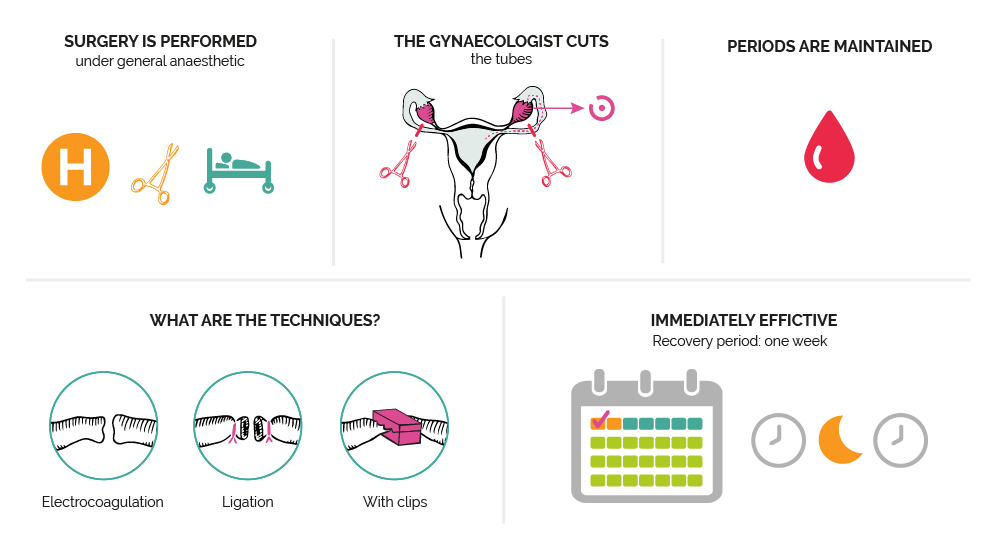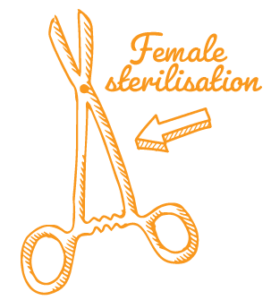The Female Sterilization
Also known as tubal ligation.
HOW DOES IT WORK
The Fallopian tubes which carry the egg from the ovary to the uterus are in most cases blocked (with clips) and sometimes tied (with thread). The aim is to prevent the egg from passing in the fallopian tubes and meeting an eventual sperm thus avoiding fertilization. Attention, the ligation does no stop ovulation, but the movement of the egg to the uterus.

Concretely, this surgery is performed in a hospital setting by a gynecologist, under general anesthesia and lasts around 30 minutes. During the appointment, a small laparoscopic incision (surgical technic), made at the navel allows access to the tubes. Chirurgical instruments are used by the gynecologist/surgeon to proceed to the medical act. Hospitalization lasts around 24 to 48 hours. In the days following the surgery, the operated area is sensitive, and pain may be felt in the abdomen. Contraceptive effect is immediate, nevertheless it is advised not to have sexual intercourse during the week following the surgery. The recovery period lasts around one week.
This surgery does not prevent the ovulation; thus, the menstrual cycle will continue to happen, with all its different stages and the menstruation’s presence. The unfertilized egg will naturally be recycled by the body which is a natural and safe process. It happens with women with or without ligation when an egg is not fertilized. Tubal ligation has no impact on sexual desire either.
This method should be seen as permanent and irreversible, because there is no possible way to have children without surgery or MAP (Medically-Assisted Procreation). Chances of tubal ligation reversal surgery (to reconnect Fallopian tubes) are weak.
INTERESTING FIGURES AND DETAILS

HOW TO HAVE TO TUBAL LIGATURE CARRIED OUT?
Step 1
You first should see a gynaecologist physician. It will be the opportunity to ask questions and learn more about the medical procedure. In Luxembourg, there are no mandatory reflection period for tube’s ligature, thus the delay can vary depending on the advice and availability of the gynaecologist.
Step 2
Once the surgery’s appointment is taken, you will go to the hospital to proceed to the surgery that lasts about half an hour under general anesthetic.
Step 3
Once the surgery is completed, it is sometimes necessary to stay at the hospital. Few days of recovery is recommended.
Step 4
The patient is now sterile.
Starting 1 April 2023, this contraceptive is free of charge on medical prescription in any Luxembourg pharmacy to people affiliated with the National Health Fund, with no age limit.
For more information: click here.
Tubal ligation is performed in a hospital setting by a gynaecologist. It is a surgical procedure carried out in the operating block under general anaesthetic.

La ligature des trompes
Is tubal ligation reversible?
Tubal ligation is called “permanent contraception”, so it should be considered irreversible. An operation called tubal ligation reversal is possible for some people to reconnect the fallopian tubes, but as these small tubes are less than a millimeter of diameter, therefore the operation does not guarantee a return to fertility and is quite costly. The success of this operation also varies according to other factors, such as age, type of sterilisation, type of tubal ligation reversal surgery, etc.). Tubal ligation must therefore be considered irreversible.
Is the procedure painful?
Tubal ligation is performed under general anaesthesia during an operation called laparoscopy. In some cases, it can also be done during a caesarean section. This means that you will not feel any pain during the operation. However, discomfort, pain and cramps may occur for a week or more after the operation. Medication may be prescribed to reduce the pain. If you are worried about pain, talk to your physician.
How long does the recovery take?
It is advisable to rest for a week after the operation, keep the incision clean, avoid scratching it or soaking it in water. It is also advisable not to have sexual relations for a week after the operation. If you have any questions, do not hesitate to contact your physician.
Does it have an impact on sexual desire?
No, tubal ligation does not affect sexual desire. You can have sex as before the operation.
Will I get my period again?
Yes, there is no change in menstruation following a tubal ligation. If you stop taking hormonal contraception to have a tubal ligation you will return to your natural hormonal cycle and therefore your periods as they were before taking hormonal contraception.
Does tubal ligation increase the risk of ectopic pregnancies (extrauterine)?
An ectopic pregnancy is the implantation of a fertilised egg outside the uterus (e.g. in the fallopian tubes). This is a dangerous situation, as the pregnancy cannot be carried to term and its development can lead to internal bleeding (heavy bleeding) which requires emergency treatment.
No. On the contrary, tubal ligation actually reduces the risk of ectopic pregnancies. The risk is 0.06% (6 ectopic pregnancies per 10,000 pregnancies) for women with tubal ligation compared to 0.6% (65 ectopic pregnancies per 10,000 pregnancies) for women without ligation.
The frequency of ectopic pregnancies increases slightly when a ligation operation fails, i.e. when it does not prevent a pregnancy, or during a tubal ligation reversal surgery.

